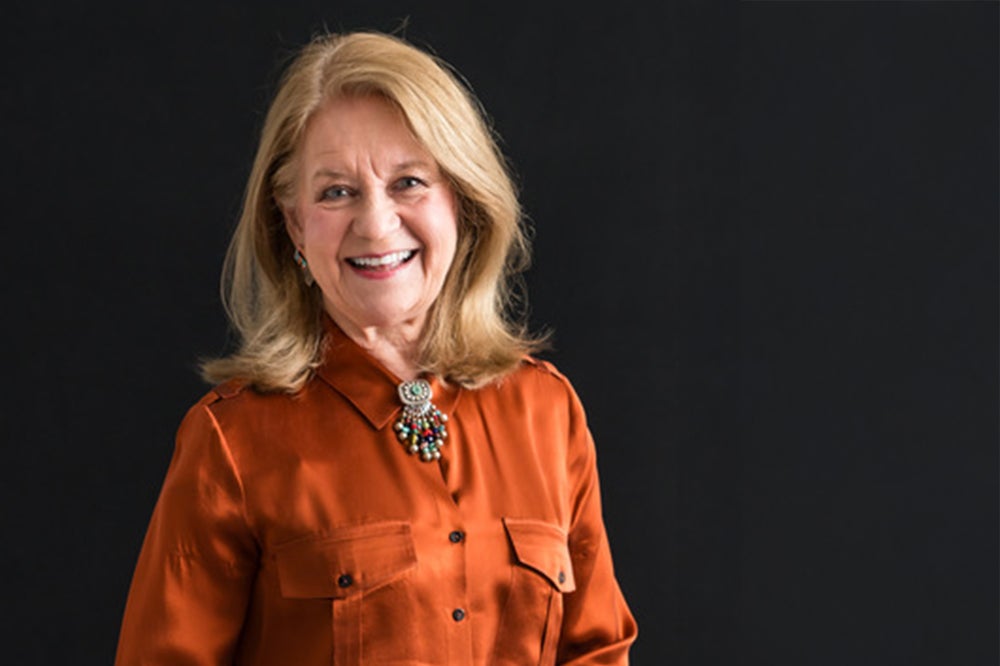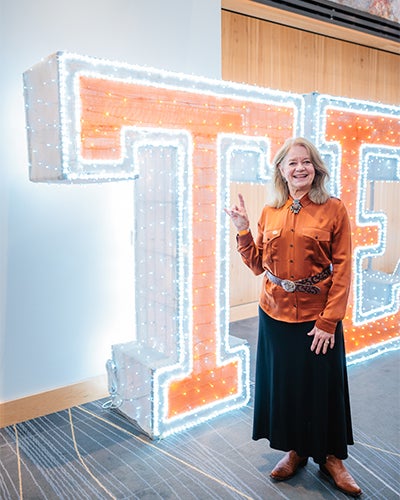
It was 1968 when Deborah Shaw Hertzog (B.S. ’72) arrived at The University of Texas at Austin. The Longhorns were national champions, and campus was abuzz with marches for peace as the Vietnam War raged on overseas.
Hertzog was mending a broken heart after leaving behind friends, loved ones and her dreams of attending the University of Illinois when her family moved to Houston the previous year. She applied to UT only after some influence from her parents who said Texas had a perfectly good state school. At the time, she wasn’t sold—she had only heard mumblings of the sleepy college town called Austin and she didn’t really understand the Hook ’em hand sign.
Life throws you challenges,
said Hertzog, now a retired educator in Boise, Idaho and creator of the Deborah Shaw Hertzog (’72) Endowed Scholarship in Special Education. I recognized right away the opportunities at UT so I set out to learn the culture, make friends in the dorm and see what I could get involved in. It did not take me long to become a very proud Longhorn.
As she found her way around the Forty Acres, Hertzog, an extrovert by nature who loves new opportunities, joined UT’s gymnastics group, became involved in theater and led students as a counselor at Camp Longhorn. She enrolled as a psychology major in the College of Liberal Arts, but by her second semester she transferred to the College of Natural Sciences, where she noticed she gravitated toward working with children.
The summer before her second year, Hertzog knew she wanted a goal, a purpose and a direction. She settled on Special Education (SPED). I had a real heart for kids with special needs,
Hertzog said, adding that she had family friends with a daughter who had Down syndrome.
Once I set that goal, I had a vision, and I embraced my responsibility as a student to be diligent and learn everything that I could,
Hertzog said.
Just before her senior year, Hertzog was awarded a scholarship for senior students in her department by then-chair Dr. Jasper Harvey, which got her more excited to be a part of that field. At the time, she became very involved with the student chapter of the Council for Exceptional Children, an international professional organization dedicated to the field of SPED.
Everything about Special Education was a little smaller, a little more intimate and more personal, so that was an advantage,
Hertzog said. You felt like the professors cared. You were not just a number.
During a meeting in his office one day, Dr. Harvey mentioned that they needed to send someone to attend the national CEC convention. Hertzog immediately volunteered, and Dr. Harvey found her the funding to attend.
Attending this national conference in Washington D.C. was the moment Hertzog realized the vastness of her field and became more motivated to be a part of it as she began to identify a career path.
I attended exhibits, talked to authors, and met some of the authors of my textbooks at UT,
Hertzog said. It makes you feel like you are part of the field. It takes everybody, from the professors doing research and to the classroom teacher working with the kids. It motivated me to go back and apply what I learned.
By the time she left UT, Hertzog felt prepared to take on the world of Special Education and was leaving with a trove of great experiences, fond memories and dear mentors, such as Dr. Harvey.
She continued to attend CEC conventions throughout her career, where she immersed herself in the field, learned about new materials and resources and made connections that helped her apply for new opportunities. There, she met the department chair of the Learning Disorders program at Georgia State University, where Hertzog went on to earn her master’s degree.
Over the span of her decades-long career, Hertzog worked across nine school districts, teaching from Houston to Atlanta and even overseas for three years at an Army base in Germany. Each position was a different challenge as she moved from one place to the next and she never felt the need to leave the classroom every five years as many of her colleagues advised her.
I just kept marching through,
Hertzog said. You can do it all, you just can’t do it all at once. I was single, I was married, I had a career and then I had children. I saved the best for last. And then I did go back to work.
Throughout her many stints in education, there were only two moments in her career that she was classroom-adjacent—once as an educational diagnostician and another time as an educational consultant and puppeteer for a disability awareness program. She also sought endorsements in Gifted and Talented, English as a Second Language, test administration and administrative duties.

I think teachers are by nature lifelong learners and I was always so excited to be back in school and I would go part time for endorsements,
Hertzog said.
Now a retired educator in Boise, Idaho, Hertzog likes to connect the dots as she looks back on her successful career. She said it all comes back to her scholarship her senior year, Dr. Harvey’s support and an unforgettable experience to attend a conference that put her field into perspective.
In an effort to support future generations of SPED teachers, Hertzog established the Deborah Shaw Hertzog (’72) Endowed Scholarship in Special Education to provide funding for undergraduate students preparing to join this field, with a preference for out-of-state Longhorns. Her gift is made in memory of Dr. Harvey.
The scholarship is a way to offer students the same opportunity I had, to pay it forward, but hopefully to also inspire them to get as much out of Special Education as they can,
Hertzog said.
Following her many years in the classroom, Hertzog’s advice to incoming teachers is to remember the importance of their role, the significance of their field and the vitality of following their passion despite the challenges they may face.
Teachers are a vibrant and important part of this field,
Hertzog said. Special Education is vast—it is 13 exceptionalities, it is assessment, it is identification, it is programming, it is meeting the special needs of kids.
Hertzog said she recalls leaving UT inspired by finding her purpose in what she chose as a major and the wonder that she felt for what was a really exciting field of study. Her hope is that her endowed scholarship and planned gift will support a new generation of teachers as they find their place, too. What I took from my time at UT was the academic motivation that I left with, which was paramount—I was setting my course,
Hertzog said.

